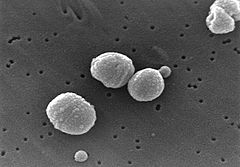Pneumococcus facts for kids
Quick facts for kids Streptococcus pneumoniae |
|
|---|---|
 |
|
| SEM micrograph of S. pneumoniae. | |
| Scientific classification | |
| Domain: | |
| Phylum: | |
| Class: |
Diplococci
|
| Order: | |
| Family: |
Streptococcaceae
|
| Genus: | |
| Species: |
S. pneumoniae
|
| Binomial name | |
| Streptococcus pneumoniae (Klein 1884)
Chester 1901 |
|
Streptococcus pneumoniae, often called pneumococcus, is a tiny living thing. It is a type of bacteria that can cause different illnesses in people. It looks like a small, round pair of beads under a microscope. This bacterium is known for causing serious infections, especially pneumonia.
Contents
Understanding Streptococcus pneumoniae
Streptococcus pneumoniae is a very common type of bacteria. It is found all over the world. This bacterium is a major reason why people get sick. Scientists first learned about it in the late 1800s. They quickly realized it was a big cause of lung infections.
What is Pneumococcus?
Pneumococcus is a kind of bacteria. It is called "gram-positive" because of how it looks under a microscope. It is also an "aerotolerant anaerobe." This means it can live with or without air. It belongs to a group of bacteria called Streptococcus.
Where Does it Live?
This bacterium often lives harmlessly in people's noses and throats. Many healthy children and adults carry it. They might not even know it is there. It can spread easily from person to person.
What Illnesses Can it Cause?
Even though it can live harmlessly, pneumococcus can cause serious problems. The most well-known illness it causes is pneumonia. This is a lung infection. It can make it hard to breathe.
Pneumococcus can also cause other infections. These include:
- Ear infections (otitis media)
- Sinus infections (sinusitis)
- Meningitis (an infection of the brain and spinal cord lining)
- Bacteremia (bacteria in the bloodstream)
These infections can be very serious. They can even be life-threatening, especially for young children and older adults.
How Does it Spread?
Pneumococcus spreads through tiny drops in the air. These drops come from a person's nose or mouth. They are released when someone coughs or sneezes. If you are close to someone who is sick, you might breathe in these drops. This is how the bacteria can get into your body.
Staying Safe: Prevention and Treatment
There are good ways to protect yourself from pneumococcus. The best way is through vaccines. There are different vaccines available. They help your body learn to fight off the bacteria. These vaccines are very important for babies and young children. They are also recommended for older adults.
Other ways to stay safe include:
- Washing your hands often.
- Covering your mouth and nose when you cough or sneeze.
- Avoiding close contact with people who are sick.
If someone gets a pneumococcal infection, doctors can treat it. They often use antibiotic medicines. These medicines help kill the bacteria. It is important to see a doctor if you think you have a serious infection.
Images for kids
See also
 In Spanish: Neumococo para niños
In Spanish: Neumococo para niños
 | Roy Wilkins |
 | John Lewis |
 | Linda Carol Brown |


